- Home
- Caroline Anderson
Mother of the Bride Page 2
Mother of the Bride Read online
Page 2
‘It’s not too bad for the next couple of weeks. I interviewed someone today for a feature that I have to write up, and I’m doing a wedding tomorrow—’
‘Can’t you hand it over to someone?’
She shook her head. ‘No. Not this one.’
‘Why not? Surely some other photographer…’
She sucked in a breath, stunned that he could dismiss her so easily, implying that any photographer could do the job as well, as if it was just a case of pressing the right button at the right time. So much for him not being indifferent to her feelings!
‘I don’t think you quite understand the process,’ she said drily, hanging onto her temper. ‘Quite apart from the fact that they want me, not some other photographer,’ she told him, ‘you have to understand that brides are very emotional and there’s no way I’d let her down at this point. I gave them my word—to quote you. And you have to respect that.’
There was a heartbeat of silence, then a quiet sigh. ‘All right. So you have to do the wedding. What time will you be through?’
‘Five? Maybe six, at the latest. It’s in Cambridge, so it’s local.’
‘So—if you get the seven-fifteen from Cambridge to King’s Cross tomorrow night, you can pick up the Deerstalker from Euston that gets to Fort William at ten the next morning. Will that be OK?’
The overnight sleeper? It would cost an arm and a leg— but she’d do it, for Jenni. ‘Yes, I’ll book it.’
‘I’ve done it. I’m doing it on line now. I’ll have the tickets waiting for you at the station to collect, and I’ll pick you up in Fort William the day after tomorrow. And, Maisie?’ he added, his voice dropping.
‘Yes?’
‘I know this is going to be difficult for you. It’ll be difficult for me, too, but we have to do this for Jenni.’
‘Of course we do,’ she said wearily. ‘And it’ll be fine. I just wish I felt they were doing the right thing.’
‘It is the right thing. It’ll be all right, Maisie. You’ll see.’
Those words again, echoing back at her over the years, reminding her of just how frail a thing love could be under pressure. She hoped he was right—heavens, how she hoped it, but she wouldn’t bank on it. They were so young, so eager, so unaware of all the pain…
‘I’ll see you at ten on Thursday,’ she said, and switched the phone off.
Thursday morning. Only—she glanced at her watch— thirty-six hours away. No time at all to shore up her defences and get her armour plating up and running.
She’d need days—
Ridiculous. She hadn’t done it in twenty years, what made her think a few more days could make any difference?
She got off the bed—the very bed where he’d loved her so tenderly, so sweetly, so patiently. So skilfully. She stroked the quilt smooth, her mind back in the long-ago days when love had been sweet and laughter had been the order of the day.
She’d been about to start her degree here at the local college—not as prestigious as one of the Cambridge University colleges, of course, but it offered a good degree in journalism—and she had needed accommodation. Cheap accommodation. And Rob, who had just graduated with flying colours from one of the Cambridge colleges, had been looking for someone to share his house. He was off to serve in the Royal Navy, a six-year commission, and he needed a caretaker, all running expenses paid in return for maintaining the house in good condition in his absence.
Only one proviso—she had to live in it alone and share it with him occasionally when he was on shore leave, but that suited her fine, because it was the only way she could afford it and it meant she could get away from home, from a repressive father who didn’t think she needed to go away to college.
So she’d arranged to view it, and they’d gone out for a drink to discuss the fine detail. Well, that had been the excuse. In fact, they’d just wanted to spend time together, and over the next few days they’d fallen headlong in love. Just a week after they’d met, she’d ended up here in this room, in this bed, giving him her heart.
He still had it. He always would.
She sighed and turned her back on the bed. She wanted nothing more than to crawl under the quilt and cry her eyes out, but she had a feature to write up before tomorrow, clothes to pack for her trip, a wedding to prepare for—and besides, she was all done crying over Robert Mackenzie. She’d worn that particular T-shirt out long ago, and she wasn’t going there again.
‘How do you think she took it?’
Badly. Especially when he’d implied that another photographer could step into her shoes at a moment’s notice. He’d have to do better than that, Rob thought ruefully.
He smiled at his daughter—his beautiful, clever, radiantly happy daughter—and lied. ‘She’s fine,’ he told her. ‘I’ve booked her train ticket, and I’ll pick her up—’
‘Let me—please? Give me time with her, so I can talk her down a little. She’ll be nervous.’
Nervous? Would she? Quite possibly, he conceded. ‘She might not be very thrilled about it, but she’s got nothing to be nervous about,’ he said, trying to reassure their daughter.
But Jenni looked at him, wise beyond her years, and shook her head. ‘Of course she has. She hated it here. She hasn’t been here for twenty years and she’ll be unsure of her welcome.’
‘But—that’s silly! She’s your mother! Of course she’s welcome,’ he said, but then he thought about it, about the defensive tone of her voice, about how much she’d seemed to hate it here, and he sighed softly.
‘I’ll still pick her up. Even more reason. I can talk to her.’
Jenni chewed her lip. ‘Dad—she won’t want to talk to you. She goes out of her way to be out if you’re coming to the house, she won’t even look at you—what if she refuses to get in the car?’
‘She won’t refuse,’ he said, wishing he was as certain as he sounded. ‘She’s not that fond of walking.’
Jenni gave a splutter of laughter and came over and hugged him, slapping him on the chest simultaneously. ‘That was mean. You be kind to her or she’ll end up in the hotel in the village, I know she will.’
‘I’ll be kind to her, Jenni,’ he promised, serious now. ‘I was always kind to her.’
‘Were you? She’s never really said anything very much about you, just that it didn’t work out.’
‘That’s about the size of it,’ he said, carefully keeping his voice neutral. ‘But don’t worry. We can do this. It’ll be fine, Jenni.’
‘Are you sure? You’ll probably fight like hell. I don’t think you know her. She seems like a pussy-cat, but she can be pretty feisty, you know.’
He laughed, but her words echoed in his head. Feisty? Oh, yes, she’d been feisty, but that wasn’t how he remembered her. He remembered her after their fights—sweet, tender, passionate—until the end. Then she’d just been withdrawn and uncommunicative, as if all the spark had gone out of her, and he hadn’t known how to get through to her. Jenni was right. He really didn’t know her, the woman who’d been his wife, who’d taken his heart and broken it into little pieces…
‘I’m sure we can be adult about it,’ he said, not at all convinced but hoping it was true.
Jenni tipped her head on one side. ‘Why did neither of you ever get married again? I mean, I know why you didn’t stay married to each other, it’s not rocket science, but why didn’t you marry anyone else? It’s not as if you’re hideous, either of you, and you’re both so nice.’
He shrugged, not intending to drag his wounds out into the open for his daughter to pick the scabs off. ‘Never got round to it, I suppose,’ he said casually. ‘First I was in the navy, and then I was juggling establishing my business in London and being a father to you, and then my own father died and I had to move up here and take over the estate. And it’s hard to meet anyone when you’re up here in the backwaters, especially if you work in an almost exclusively male environment. Bear in mind that the majority of women who come to the estate are partners of men
who come for the sport. They aren’t looking for a husband.’
‘Are you sure? Maybe they want to switch husbands? And anyway, that’s rubbish. It’s never hard to meet people when you’re rich, it’s just hard to meet the right people,’ she said drily, and he could tell from her tone that there was a wealth of hurt there. She’d encountered some gold-diggers at uni, men who’d only been interested in her for her inheritance, she’d told him, but Alec, fiercely protective, had been there for her through thick and thin, and he knew the young man loved his daughter from the bottom of his kind and generous heart.
If only they’d been so lucky, him and Maisie. If only they’d found a love like that. It might not be rocket science, but it was a mystery to him why they hadn’t got on. It had been so good at first, so special. Nothing had ever felt like it since, and that, of course, was why he’d never married again. Because to be married to anyone other than his Maisie would have been a travesty, a betrayal of everything he stood for.
He swallowed and stepped back, gently disentangling himself from Jenni’s embrace, and headed for the door. ‘Sorry, sweetheart, I’ve got a million things to do. I’ll see you for dinner.’
He went out, whistling the dogs, and headed down to the water. He needed a walk, a good, long stretch along the beach and then up over the headland, the point that gave Ardnashiel its prefix. There had been a hut there once, evidently, a shiel, which long ago had given way to the original castle, and he climbed the hill towards the ruins, needing the peace, the solitude that he would find there.
It was his retreat, the place he went to soothe his soul, the harsh wind and savage sea the only things wild enough to match the turmoil in his heart, but today they could do nothing to wipe out the memories of his love, here in this place, where he’d brought her so many times. And now, for the first time, she was coming back, not to him, but to the castle.
It was a step he hadn’t been sure she’d ever take, but now she was, and in two days she’d be here.
His beloved, beautiful Maisie was coming home…
The train was on the platform as she collected her ticket, and she only just made it before the doors closed.
The wedding had gone on longer than she’d expected, and it had been harder than she’d imagined. She didn’t know why—maybe because now she had become the mother of a bride, and could put herself in Annette’s shoes, with the agony of her uncertain future. She’d had a health scare, and was facing a gruelling treatment regime over the next months and maybe years, but today had not been a day for dwelling on that. Today was her daughter’s day, and Annette had been radiant.
‘I’m so proud of her. Doesn’t she look beautiful?’ she’d said to Maisie in a quiet, private moment, a little oasis in the midst of the revelry, and Maisie’s eyes had filled.
‘Yes—yes, she does, she looks absolutely gorgeous, and so do you.’
Annette had met her eyes, her own distressed. ‘Take plenty of photos,’ she begged, and then added softly, ‘Just in case.’
Maisie had swallowed. ‘I will. I have. I’ve got some wonderful ones of you together, and I’ll get them to you very soon.’
‘Thank you,’ Annette had said almost silently, and Maisie had held her gently and shared that quiet moment of knowledge that there might not be very much time left to her, and every second mattered.
So now, on the train to London, she was downloading the photos from her camera onto her laptop, then burning them onto several disks and labelling them. Thank God for mobile technology, she thought as she put the disks in the post on her way from King’s Cross to Euston.
She was pleased with the photos. She’d go through them, of course, editing out the dross and cropping and tidying up the images so they could look at them on her website, and she’d produce an album with the family once they’d chosen the ones they wanted, but for now, at least, they’d get them in the raw form almost immediately to look through with Annette.
And hopefully, in the years to come, she’d be showing them to her grandchildren, but if not, at least they’d have a wonderful record of that beautiful day.
She blinked away the tears and stared out of the window of the sleeper at the passing lights. The cabin was claustrophobic—first class, the best it could be, but she was too full of emotion, from the wedding and from the task facing her, to sit still.
She locked up her cabin securely and went to the lounge to order food. She hadn’t eaten at the wedding, and she’d had her hands full on the platform at Euston, and her blood sugar was through the floor.
Even so, she didn’t touch her supper. Her stomach felt as if someone had tied a knot in it and she gave up and went back to her cabin, lying down on the narrow berth and staring at the window, watching the lights flash past as they moved through stations, but mostly it was dark, the velvety blackness of the countryside all-engulfing as the train carried her north towards Rob.
And Jenni. It was about Jenni, she reminded herself— Jenni and Alec. She had to keep focus, remind herself what she was doing this for, or she’d go crazy.
Actually, what she needed was sleep, not the constant rumble of the rails, the clatter of the points, the slowing and shunting and pausing while goods trains went past, until she thought she’d scream. It wasn’t the train’s fault. It was comfortable, private—as good as it could be. It was just that she didn’t want to be on it, didn’t want to be doing this, and the memories were crashing over her like a tidal wave.
She’d done it for the first time when she was pregnant, when she’d just finished her first year’s exams at Cambridge and was heading up to Scotland to wait for the birth. She’d wanted to stay in Cambridge, in their little house, but Rob had insisted she should move up to the castle. ‘You can be looked after there, and my parents will want to spend time with the baby,’ he’d said and so, because he wasn’t there to drive her this time, as he had every other time they’d been, because he was already away at sea, she’d got on the train, exhausted, aching, and by the time she’d reached Glasgow, she’d realised she was in labour.
She’d been taken straight to the hospital in Fort William, and the next few hours were still a blur in her mind, but as the train rolled on, she kept reliving it, snatches of the pain and fear, knowing Rob was at sea and wanting him, needing him with her. And when he’d come at last, weeks later, he’d been different—distant, almost as if he couldn’t bring himself to touch her. She’d known then that there was something wrong, but they hadn’t talked about it, just tiptoed carefully around the cracks in their relationship as if they weren’t there. And then he’d gone away again, back to sea, and left her behind to face the cold, dark winter there without him.
She hadn’t been able to do it. Leaving the castle, going back south to Cambridge—it had seemed such a sensible move, the only thing she could do to stay sane. It had never occurred to her that Rob wouldn’t follow.
She turned over, thumped the pillow, squeezed her eyes shut and pulled the quilt over her head, but the images were still there, crowding into her head, keeping her awake.
She gave up in the end, sitting perched on the lid of the washbasin in the corner and staring out of the window as the dawn broke. The countryside was getting wilder, the hills higher, the gentle ripples in the landscape giving way to crumples and then sharp, jagged pleats as they went further north. It was stark, bleak, with a wild majesty that made something in her ache at the beauty of it, but it terrified her, too, because of all the memories it held for her.
She was washed and dressed before the attendant knocked on the door with her breakfast—a hot bacon roll, tea and some fruit salad—and she sat on the bunk staring out over the wild, untamed landscape as the train slowly wended its way around the hills to Fort William, stopping at every station on the way, tiny outposts of civilisation in the midst of barren wilderness.
Not long now, she thought, and her stomach rejected all thought of the bacon roll after the first bite. She was fraught with nerves, too tense to eat, so she
sipped her tea as they climbed up onto the flat and desolate plateau of Rannoch Moor, picked at the fruit because it was ridiculous to have nothing, and then gathered her things together as they pulled into the station in Fort William.
And then, when it was too late to do anything about it, she glanced at the mirror and winced. She looked awful. Dark circles under her tired, strained eyes, her hair in wild red corkscrews, needing attention—she hated travelling, hated the rush and pressure and hanging about. And Ardnashiel was waiting.
I’m not ready for it! she wanted to wail, but she didn’t, she just picked up her camera bag, slung it over her shoulder, picked up her laptop and her suitcase and got off the train.
It should be like Brief Encounter, she thought, all swirling steam and whistles, but it wasn’t, it was loud and noisy, unintelligible and horribly familiar. She took a deep breath and looked up, and he was there, walking slowly towards her in jeans and a sweater, with his rangy, muscular limbs and broad, solid shoulders. His hair was touched with grey now, she noticed in surprise, crow’s feet at the corners of his wary, slate-blue eyes, and when he smiled, the crow’s feet crinkled and turned her legs to mush.
‘Maisie,’ he said, and his voice curled round her again, seeping into her heart and unravelling all her resolve.
‘Hello, Rob. Here, you can make yourself useful,’ she said, and handed over her luggage before he could do anything stupid like kiss her cheek and pretend they were friends.
‘Is this all?’
‘Three bags? Isn’t that enough? I can tell what sort of women you’ve been mixing with, Mackenzie.’
His smile was wry. ‘Yeah, your daughter. I’ve conveyed her and her clutter back and forth to uni for the last three years, remember. I know how you women travel.’
‘I’m only here for a week—two weeks, max.’
‘We’ll see. Come on, then, let’s head back.’
To Ardnashiel. Her heart thumped, and she bit her lip as he led her into the car park and plipped the remote control in his hand. Lights flashed on a car—low, sleek and expensive. She might have known. He’d always liked expensive cars. He stashed her belongings in the boot, then opened the door for her. ‘Can I put the lid down, or do you want it up?’ he asked as he slid in behind the wheel and turned to her.

 From Heartache to Forever
From Heartache to Forever A Single Dad to Heal Her Heart
A Single Dad to Heal Her Heart Healing Her Emergency Doc
Healing Her Emergency Doc Tempted by the Single Mom
Tempted by the Single Mom Tempted By The Single Mom (Yoxburgh Park Hospital)
Tempted By The Single Mom (Yoxburgh Park Hospital) The Baby Swap Miracle
The Baby Swap Miracle The Tycoon's Instant Family
The Tycoon's Instant Family Their Christmas Family Miracle
Their Christmas Family Miracle Valtieri's Bride & A Bride Worth Waiting For: Valtieri's BrideA Bride Worth Waiting For
Valtieri's Bride & A Bride Worth Waiting For: Valtieri's BrideA Bride Worth Waiting For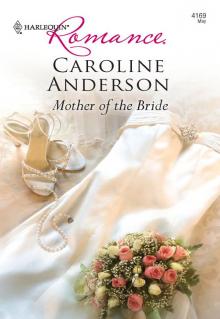 Mother of the Bride
Mother of the Bride Their Meant-to-Be Baby
Their Meant-to-Be Baby Best Friend to Wife and Mother?
Best Friend to Wife and Mother? Their Own Little Miracle
Their Own Little Miracle The Valtieri Marriage Deal
The Valtieri Marriage Deal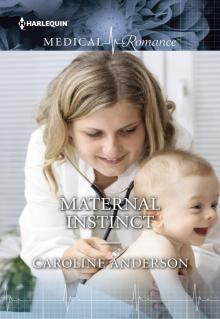 Maternal Instinct
Maternal Instinct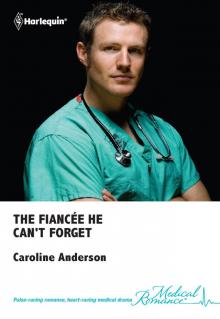 The Fiancé He Can't Forget
The Fiancé He Can't Forget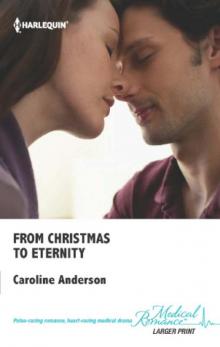 From Christmas to Eternity
From Christmas to Eternity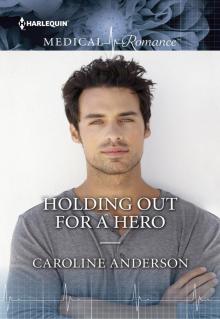 Holding Out For a Hero
Holding Out For a Hero Bound by Their Babies
Bound by Their Babies The Ideal Choice
The Ideal Choice SNOWED IN WITH THE BILLIONAIRE
SNOWED IN WITH THE BILLIONAIRE The Perfect Christmas
The Perfect Christmas The Baby Question
The Baby Question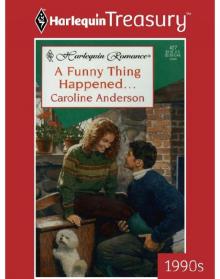 A Funny Thing Happened...
A Funny Thing Happened...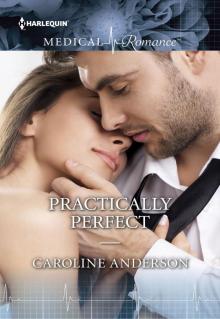 Practically Perfect
Practically Perfect A Wife and Child to Cherish (Audley Memorial Hospital)
A Wife and Child to Cherish (Audley Memorial Hospital) Taken For Granted
Taken For Granted The Midwife's Longed-For Baby
The Midwife's Longed-For Baby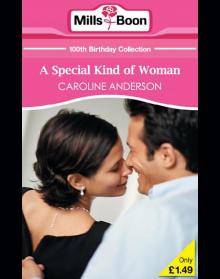 A Special Kind of Woman
A Special Kind of Woman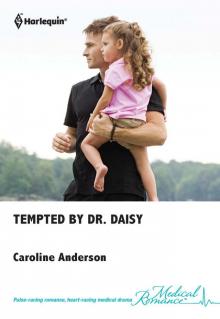 Tempted by Dr. Daisy
Tempted by Dr. Daisy A Mother by Nature
A Mother by Nature Accidental Rendezvous
Accidental Rendezvous His Very Own Wife and Child
His Very Own Wife and Child The Surgeon's Miracle
The Surgeon's Miracle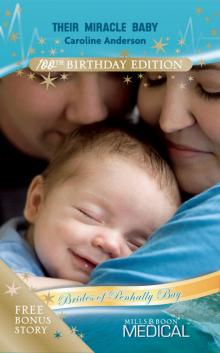 Their Miracle Baby
Their Miracle Baby The Valtieri Baby
The Valtieri Baby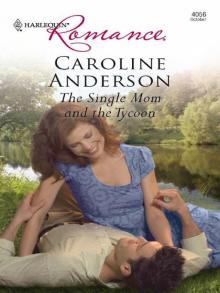 The Single Mom and the Tycoon
The Single Mom and the Tycoon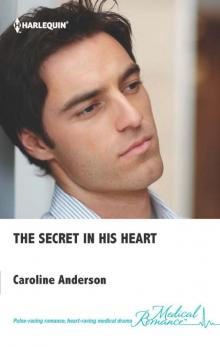 The Secret in His Heart
The Secret in His Heart The Real Fantasy
The Real Fantasy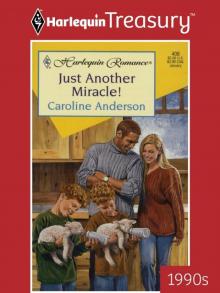 Just Another Miracle!
Just Another Miracle!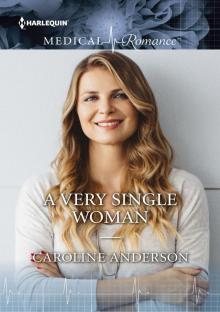 A Very Single Woman
A Very Single Woman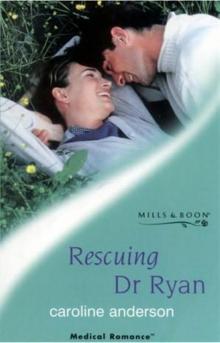 Rescuing Dr Ryan
Rescuing Dr Ryan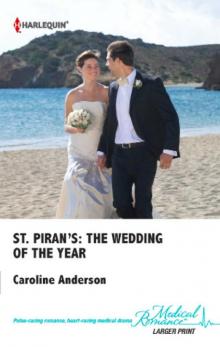 St. Piran's: The Wedding of The Year
St. Piran's: The Wedding of The Year Accidental Seduction
Accidental Seduction One Step At A Time
One Step At A Time A Perfect Hero
A Perfect Hero